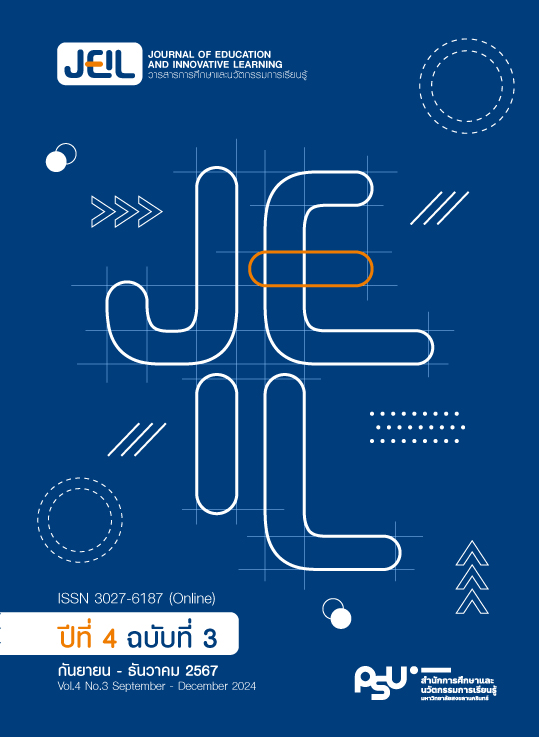การจัดการเรียนรู้ของนักศึกษาด้วยการจัดการเรียนการสอนเชิงบูรณาการกับการทำงานในรายวิชาการนำนโยบายไปปฏิบัติและการประเมินผล
Main Article Content
บทคัดย่อ
การวิจัยในครั้งนี้มีวัตถุประสงค์เพื่อ 1) ศึกษาการจัดการเรียนรู้ของนักศึกษาต่อการจัดการเรียนการสอนเชิงบูรณาการกับการทำงาน และ 2) เพื่อศึกษาระดับความคิดเห็นของนักศึกษาต่อการจัดการเรียนการสอนเชิงบูรณาการกับการทำงาน รายวิชาการนำนโยบายไปปฏิบัติและการประเมินผล ดำเนินการวิจัยโดยวิธีการวิจัยแบบผสานวิธี กลุ่มตัวอย่างเป็นนักศึกษาหลักสูตรรัฐประศาสนศาสตรบัณฑิต ชั้นปีที่ 3 คณะพาณิชยศาสตร์และการจัดการ มหาวิทยาลัยสงขลานครินทร์ วิทยาเขตตรัง ที่ลงทะเบียนเรียนรายวิชาการนำนโยบายไปปฏิบัติและการประเมินผลในภาคเรียนที่ 1 ปีการศึกษา 2565 จำนวน 32 คน เก็บข้อมูลโดยการสัมภาษณ์เชิงลึก การสังเกตของอาจารย์ผู้สอน และแบบสอบถาม ผลการศึกษาพบว่า 1) นักศึกษาสามารถบรรลุผลลัพธ์การเรียนรู้หลายด้าน ทั้งด้านสังคม ด้านพุทธพิสัย ด้านทักษะพิสัย และด้านจิตพิสัย 2) นักศึกษามีระดับความคิดเห็นในภาพรวมระดับมากที่สุด (x̄=4.62, S.D.=0.42) โดยเฉพาะประเด็นเกี่ยวกับการช่วยส่งเสริมให้ผู้เรียนรู้จักทำงานร่วมกับผู้อื่นมีคะแนนเฉลี่ยสูงสุด (x̄=4.79, S.D.=0.42) ส่วนประเด็นการช่วยฝึกให้ผู้เรียนมีเหตุผล มีคะแนนเฉลี่ยน้อยที่สุด (x̄=4.47, S.D.=0.51)
Article Details

อนุญาตภายใต้เงื่อนไข Creative Commons Attribution-NonCommercial-NoDerivatives 4.0 International License.
เนื้อหาและข้อมูลในบทความที่ตีพิมพ์ในวารสารการศึกษาและนวัตกรรมการเรียนรู้ ถือเป็นข้อคิดเห็นและความรับผิดชอบของผู้เขียน ซึ่งกองบรรณาธิการวารสาร ไม่จำเป็นต้องเห็นด้วยหรือร่วมรับผิดชอบใด ๆ และไม่สงวนสิทธิ์การคัดลอกบทความเพื่อใช้ประโยชน์ทางวิชาการ แต่ให้อ้างอิงข้อมูลแสดงที่มาของบทความทุกครั้งที่นำไปใช้ประโยชน์
เอกสารอ้างอิง
Anderson, L. W., Krathwohl, D. R., Airasian, P. W., Cruikshank, K. A., Mayer, R., Pintrich, P. R., Raths, J. D., & Wittrock, M. C. (2001). A taxonomy for learning, teaching, and assessing: A revision of Bloom's taxonomy of educational objectives. New York: Longman.
Asawapoom, S. (2018). Thai education 4.0: New concept and trends of Thai education provision. Journal of Ratchathani Innovative Social Sciences, 1(1), 1-11. Retrieved from https://so03.tci-thaijo.org/index.php/JRISS/article/view/133807 [in Thai]
Ball, S. J. (1998). Big policies/small world: An introduction to international perspectives in education policy. Comparative Education, 34(2), 119-130. doi:10.1080/03050069828225
Bartosh, O., Danko, D., Kanyuk, O., Hodovanets, N., & Myhalyna, Z. (2023). Based learning in the education process of a higher education institution. Revista Amazonia Investiga, 12(64), 208-216. doi:10.34069/AI/2023.64.04.20
Bloom, B. S. (Ed.), Engelhart, M. D., Furst, E. J., Hill, W. H., & Krathwohl, D. R. (1956). Taxonomy of educational objectives, handbook I: The cognitive domain. New York: David McKay.
Dye, T. (2016). Understanding public policy (15th ed.). New York: Pearson.
Jackson, D., & Rowe, A. (2023). Impact of work-integrated learning and co-curricular activities on graduate labour force outcomes. Studies in Higher Education, 48(3), 490-506. doi:10.1080/03075079.2022.2145465
Khumraksa, B., & Rakbamrung, P. (2022). Effect of research–based learning: Science student teacher’s opinions on their learning outcomes according to the Thai higher education qualifications framework and environmental science learning achievement. Journal of Research Unit on Science, Technology and Environment for Learning, 13(1), 125-141. Retrieved from https://ejournals.swu.ac.th/index.php/JSTEL/article/view/13098 [in Thai]
Krathwohl, D. R. (2002). A revision of Bloom's taxonomy: An overview. Theory Into Practice, 41(4), 212-218.
Mabungela, M., & Mtiki, V. (2024). Accelerating graduate employability through work-integrated learning. Research in Social Sciences and Technology, 9(1), 291-304. Retrieved from http://www.jstor.org/stable/1477405.
Malawai, N., Choochom, O., & Peungposop, N. (2022). Student teamwork: Causal factors, suggestions for research. Journal of Roi Kaensarn Academi, 7(3), 425-438. Retrieved from https://so02.tci-thaijo.org/index.php/JRKSA/article/view/252945 [in Thai]
Ministry of Higher Education, Science, Research and Innovation. (2022). U2T for BCG project. Retrieved from https://www.bcg.in.th/news/what-is-u2t-for-bcg [in Thai]
National Statistical Office. (2021). Definition of higher education. Retrieved from https://statstd.nso.go.th/definition/projectdetail.aspx?periodId=47&defprodefId=569 [in Thai]
Office of National Higher Education Science Research and Innovation Policy Council. (2022). Sustainable development goals–SDGs. Retrieved from https://www.nxpo.or.th/th/8081 [in Thai]
Prachyapruit, A. (2017). Development of teacher preparation model to serve education 4.0. Romphruek Journal, 35(3), 101-136. Retrieved from https://so05.tci-thaijo.org/index.php/romphruekj/article/view/117141 [in Thai]
Professional and Organizational Development Network of Thailand Higher Education. (2022). Research-based learning. Retrieved from https://active-learning.thailandpod.org/learning-activities/research-based-learning [in Thai]
Sinthuchai, S., Ubolwan, K., & Panidchakul, K. (2020). Team-based learning: Implementing in learning and teaching. Journal of Health and Nursing Research, 36(3), 273-283. Retrieved from https://he01.tci-thaijo.org/index.php/bcnbangkok/article/view/247010 [in Thai]
Smith, C., Ferns, S., & Russell, L. (2014). The impact of work-integrated learning on student work-readiness. The Office for Learning and Teaching.
Taneerat, W. (2021). Effectiveness of work-integrated learning model: Case study on project formulation and policy analysis course. Journal of Education and Innovative Learning, 1(2), 141-156. Retrieved from https://so06.tci-thaijo.org/index.php/jeil/article/view/248826 [in Thai]
United Nations. (2022). Sustainable development goals (SDGs). Retrieved from https://sdgs.un.org/goals.
Wessels, I., Rueß, J., Gess, C., Deicke, W., & Ziegler, M. (2021). Is research-based learning effective? Evidence from a pre–post analysis in the social sciences. Studies in Higher Education, 46(12), 2595-2609. doi:10.1080/03075079.2020.1739014
Yamnun, S. (2004). Cooperative education: Educational management model for economic security. Bangkok: National Defence College. [in Thai]
Yawai, A., & Vongchavalitkul, N. (2019). Development of learning outcomes by creating a learning environment based on working in real conditions. Journal of Education Studies, 47(Suppl.2), 407-427. Retrieved from https://so02.tci-thaijo.org/index.php/EDUCU/article/view/232664 [in Thai]


